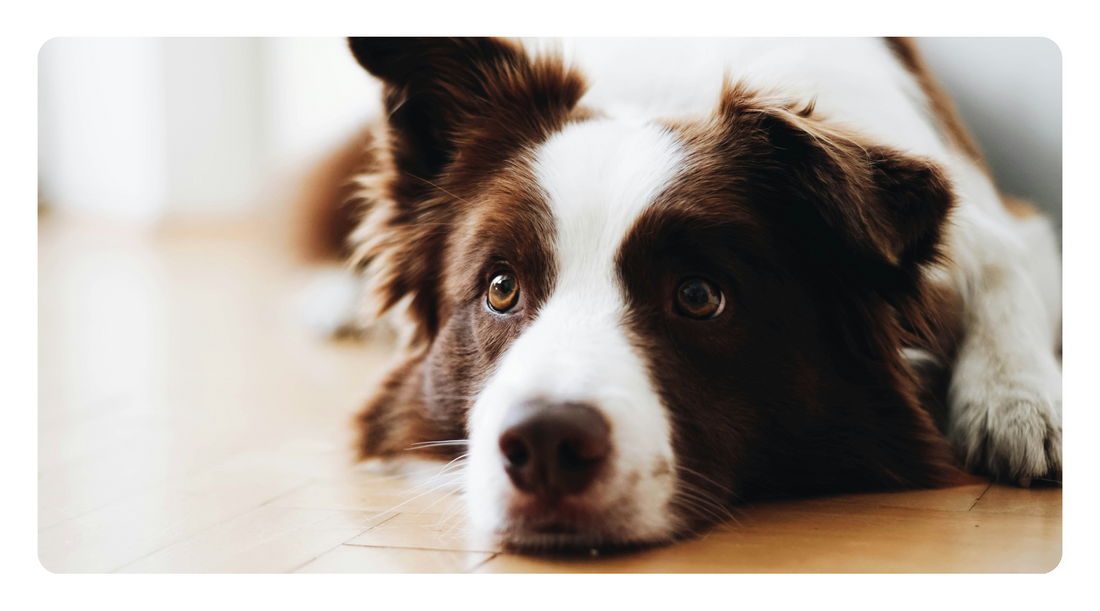Inflammatory Bowel Disease (IBD) in dogs is more than just occasional tummy trouble, it’s a chronic, often progressive condition that can severely impact your dog’s quality of life if not properly managed. IBD involves ongoing inflammation of the gastrointestinal (GI) tract, typically affecting the stomach, small intestine, or colon. It often presents with symptoms like vomiting, diarrhea, weight loss, poor appetite, and even changes in mood or behavior.
Conventional treatments usually rely heavily on corticosteroids and prescription hydrolyzed diets. While these can provide temporary relief, they rarely address the root cause, and often come with side effects. More and more dog parents are seeking a natural, holistic approach that doesn’t just suppress symptoms but works to heal the gut, restore balance, and prevent flare-ups long-term.
The good news? It’s absolutely possible. With the right tools and an integrative strategy, many dogs with IBD can experience significant improvement, even remission, without being dependent on pharmaceuticals for life.
What Is Canine IBD?
IBD is an umbrella term for several chronic gastrointestinal disorders involving inflammation and abnormal immune response in the gut lining. It can be caused by a combination of factors, including:
-
Disruption of the gut microbiome (dysbiosis)
-
Food sensitivities or intolerances
-
Genetic predisposition
-
Chronic stress
-
Environmental toxins (e.g., pesticides, mycotoxins, plastic residues)
-
Previous use of medications like antibiotics, NSAIDs, or vaccines
Over time, inflammation damages the mucosal lining of the gut, impairing digestion, nutrient absorption, and immune regulation. The result is a vicious cycle of symptoms and gut dysfunction that can be hard to break without addressing root causes.
Common Symptoms of IBD in Dogs
Symptoms of IBD vary from dog to dog and may wax and wane over time. Common signs include:
-
Chronic or intermittent vomiting
-
Diarrhea or soft stools (sometimes with mucus or blood)
-
Bloating and gas
-
Weight loss, despite a normal or increased appetite
-
Loss of appetite or picky eating
-
Lethargy and low energy
-
Skin issues or poor coat condition
-
Behavioral changes (anxiety, restlessness, irritability)
Flare-ups are often triggered by changes in diet, stress, environmental toxins, or a weakened immune response.
Step 1: Heal the Gut With Species-Appropriate Nutrition
Food is foundational in the natural management of IBD. Highly processed kibble, common proteins, and inflammatory ingredients are often at the root of chronic digestive distress.
Nutritional strategies include:
-
Feeding a fresh, lightly cooked or raw diet using novel or less-reactive proteins (e.g., rabbit, duck, venison, or goat)
-
Eliminating common allergens like chicken, beef, wheat, corn, and dairy
-
Including gut-healing foods such as bone broth, green tripe, pumpkin, and fermented veggies
-
Rotating proteins and vegetables every few weeks to prevent new sensitivities
-
Avoiding synthetic additives, preservatives, and fillers found in commercial diets
Working with a holistic vet to create an elimination diet can be a game changer for identifying food triggers and calming inflammation.
Step 2: Repair and Seal the Gut Lining
In dogs with IBD, the gut lining becomes damaged and permeable, a condition often referred to as “leaky gut.” This allows undigested food, toxins, and microbes to enter the bloodstream, fueling immune overreaction.
Key gut-repair nutrients include:
-
L-glutamine – essential for regenerating gut lining cells
-
Collagen peptides and gelatin – support tissue repair and mucosal integrity
-
Slippery elm and marshmallow root – mucilaginous herbs that soothe and protect the GI tract
-
Zinc carnosine and vitamin A – important cofactors in mucosal healing
-
Aloe vera (inner leaf) – anti-inflammatory and restorative to the intestinal lining
Use these as part of a structured gut-healing protocol, with guidance from a holistic veterinarian.
Step 3: Restore the Microbiome
The gut microbiome is central to IBD. Years of antibiotic use, processed diets, and chronic inflammation lead to dysbiosis, an imbalance of harmful and beneficial bacteria.
To restore balance and build resilience:
-
Supplement with multi-strain, canine-specific probiotics that include Lactobacillus, Bifidobacterium, and Enterococcus strains
-
Use soil-based probiotics (SBOs) like Bacillus subtilis for added durability and diversity
-
Include Saccharomyces boulardii, a beneficial yeast that helps calm inflammation and restore microbial balance
-
Feed prebiotics (like dandelion root, inulin, or burdock) in small, controlled amounts to encourage the growth of good bacteria
-
Add fermented foods or small amounts of raw green tripe to enhance diversity
Microbiome restoration takes time, commit to at least 8–12 weeks of consistent support.
Step 4: Reduce Inflammatory and Environmental Triggers
Dogs with IBD often have heightened sensitivity to toxins, chemicals, and stress. Reducing the total body burden can make a profound difference.
Ways to lower the toxic load:
-
Use filtered water to avoid chlorine, fluoride, and heavy metals
-
Replace plastic food bowls and containers with stainless steel or ceramic
-
Switch to natural cleaning products and fragrance-free grooming supplies
-
Limit exposure to flea/tick pesticides and unnecessary medications
-
Reduce vaccine frequency with titer testing when appropriate
Equally important: support your dog emotionally. Chronic stress alters gut motility, affects immune function, and can lead to flare-ups. Provide a predictable routine, plenty of sleep, enrichment activities, and gentle exercise.
Step 5: Partner With a Holistic or Integrative Vet
Managing IBD naturally isn’t about rejecting conventional medicine, it’s about using it wisely while addressing the root causes. An integrative vet can help you:
-
Develop a step-by-step transition plan from medications to natural therapies
-
Monitor your dog’s progress through labs and clinical signs
-
Tailor supplements and nutritional protocols to your dog’s unique needs
In some cases, short-term medications may be necessary to stabilize your dog while natural interventions take hold. That’s okay. The goal is to reduce reliance on pharmaceuticals over time.
Final Thoughts
IBD can feel overwhelming, but it doesn’t have to be a life sentence. With a holistic approach focused on nutrition, gut healing, microbiome support, toxin reduction, and emotional wellbeing, many dogs not only improve, they thrive.
At The Organic Dog Shop, we’re passionate about helping dog parents find safe, effective, and natural tools for chronic conditions like IBD. We offer a curated collection of gut-healing supplements, microbiome formulas, gentle detoxifiers, and clean feeding solutions to support every step of your dog’s healing journey.
Explore our digestive health collection today, and help your dog find relief, balance, and vibrant health, naturally.

